Pregnancy is an exciting time when parents ponder over their lives and reflect upon their routine habits. They educate themselves and make healthy changes in their lives for a safe pregnancy and a healthy baby.
But there is one major thing that most expectant parents don’t take into consideration: the effect of air contaminants on their to-be-born baby’s health.
Common air toxicants include ozone, nitrogen dioxide, carbon monoxide, and sulfur dioxide, as revealed by the American Lung Association. Recent studies have shown that these air contaminants can have a significant impact on the health of both the baby and the mother. And since most people stay 90 percent of the time indoors, pregnant parents need to ensure excellent indoor air quality.
They need to make sure that every component of their HVAC system, including the furnace, the air conditioner, vents, air filters, dehumidifiers, heat pumps, and others are adequately maintained and repaired on time.
Ahead, we’ve explained how indoor air quality affects expectant moms and baby births.
Under-Weight Baby Birth
A healthy baby’s weight right after pregnancy should be somewhere between 6 and 9 pounds. If the baby weighs 5 pounds, eight ounces (2,500 grams) or less, it’s considered underweight. According to the Centers for Disease Control (CDC), nearly 8 percent of babies are born underweight in the United States.
Several research studies have found a connection between air pollution and low birth weight. According to a study conducted in Los Angeles, expectant moms who lived in polluted areas gave birth to underweight babies with an average weight of 0.69 pounds.
Premature Birth

If the birth takes place before the beginning of the 37th week of pregnancy, it is a premature birth. Babies born prematurely run a higher risk of developing permanent neurological disabilities and physical impairments, as well as respiratory disorders, heart problems, weak immune system, heat intolerance, immature digestive tract, and impaired vision.
Preterm birth can take place for many medical reasons; however, researches have also found strong links between air pollution and premature birth.
According to astudy conducted by the Stockholm Environment Institute (SEI), 18 percent of the 2.7 million premature births in 2010 happened because mothers were excessively exposed to particulate matter in the air. Another 2013 study of Sweden showed a link between ozone exposure during the first trimester and premature birth.
Risk of Miscarriage and Infertility
A 2018 review research revealed that women who were exposed to air pollution ran a higher risk of infertility. Another study found that infertility rates in Northern California decreased after eight coal and oil-burning plants were shut down. The researchers found that it was due to the lower levels of nitrogen oxide (NO) and particulate matter in the air.
A lot of research work has also been done to find the link between poor air quality and miscarriages. Studies have found that exposure to excessive air contaminants, even for a short period could lead to pregnancy loss or miscarriage.
Protect your health and your to-be-born baby’s wellbeing by regular maintenance and inspection, and timely repairs and replacements of your HVAC system. For reliable hvac contractor Chicago, you can get in touch with Global Heating and Cooling in Chicago. By hiring our experts, you can rest assured that all your HVAC needs will be taken care of on time.
For more information about our services, call us at (773) 801-3734.


